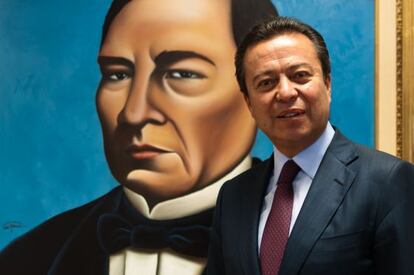PRI leader: Reforms haven’t caused chaos on the streets of Mexico
The president of ruling party believes there many false claims about Peña Nieto’s proposals

In the mind of the leader of Mexico’s ruling Institutional Revolutionary Party (PRI), the series of reforms that are being introduced by President Enrique Peña Nieto has not unsettled Mexicans.
César Camacho Quiroz, a lawyer who is also president of the PRI, has the extraordinary capability of adapting to circumstances when it comes down to negotiating. On Monday, he met with two EL PAÍS reporters at his office in PRI headquarters the day after Peña Nieto announced his tax reform proposals.
It also came a day after Andrés Manuel López Obrador, a two-time presidential candidate who represents the left, announced a massive rally to protest the reforms. But Camacho has played down hints of any discontent among Mexicans.
“The reforms have not stirred up a raucous Mexico,” he said.
“Those of us who are pushing these reforms have an enormous challenge when it comes to explaining them while there are a lot of things being said in the streets that are far from true,” he said.
“And I assume part of that responsibility because we are the ruling party, but there is also an artificial scenario of conflict that is being created by those who say we want to privatize education and privatize Pemex, which is not the case.
“Rather than being afraid of what is happening on the street, this is in fact the focus of the PRI’s attention,” Camacho said.
The pact is the impulse for a democratic transition ”
A majority of analysts agree that there are shortcomings to the tax reform plan – the middle class will continue to pay higher taxes – and with the sudden elimination of a proposed value added tax (VAT) on prescription drug and food, they also believe that the Peña Nieto government took a lot of steam out of the leftist parties’ attempts to rally supporters.
“This is a reform that the country needs, one that is balanced and which cannot be seen as separate from the others; one that was created with political sensitivity and which touches on two important issues: a universal social security system and unemployment insurance,” Camacho said.
The PRI president explained that the tax reform also helps “reach out” to the opposition, underscoring the need to drum up support because the party doesn’t have an absolute majority in Congress to propose changes to the Constitution on its own.
He also waved off the importance of the surprise elimination of the VAT proposal, which had been included in the reform during a PRI party meeting last March.
“It was added on based on passed circumstances,” he said. “We didn’t want all of the discussion on tax reform to revolve around the VAT.”
Tax restructuring plan is the last in the series of the major reforms to be released, and part of the package the opposition National Action Party (PAN) and Democratic Revolutionary Party (PRI) agreed to with Peña Nieto. The so-called Pact for Mexico was signed on December 2 – one day after he took office. Since then there have been 10 intense months of negotiations in which Camacho actively took part.
“The pact is the impulse for a democratic transition,” he said, “and without it we would not have been able to achieve a high quality legislature.”
Camacho rejected notions that the Peña Nieto would take all the credit for the reforms, leaving the PRI out of the realm, or that the party has had a rough year in 2013. “What we are doing is building a new relationship with the executive. It is true that we lost the elections in Baja California last July but we were able to celebrate victory in 59 percent of the municipalities that were up for grabs… The PRI is a party in transition, and is very agile internally, and we are very open to society, above all to women and young people.”
Tu suscripción se está usando en otro dispositivo
¿Quieres añadir otro usuario a tu suscripción?
Si continúas leyendo en este dispositivo, no se podrá leer en el otro.
FlechaTu suscripción se está usando en otro dispositivo y solo puedes acceder a EL PAÍS desde un dispositivo a la vez.
Si quieres compartir tu cuenta, cambia tu suscripción a la modalidad Premium, así podrás añadir otro usuario. Cada uno accederá con su propia cuenta de email, lo que os permitirá personalizar vuestra experiencia en EL PAÍS.
¿Tienes una suscripción de empresa? Accede aquí para contratar más cuentas.
En el caso de no saber quién está usando tu cuenta, te recomendamos cambiar tu contraseña aquí.
Si decides continuar compartiendo tu cuenta, este mensaje se mostrará en tu dispositivo y en el de la otra persona que está usando tu cuenta de forma indefinida, afectando a tu experiencia de lectura. Puedes consultar aquí los términos y condiciones de la suscripción digital.








































